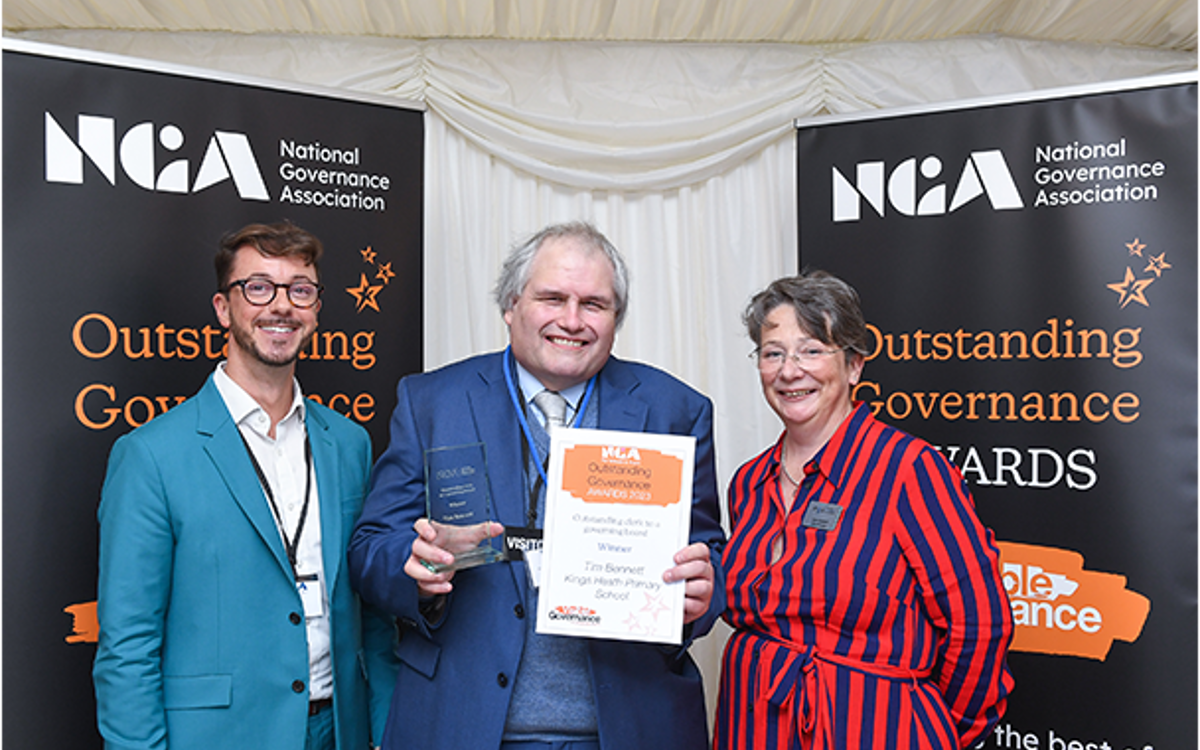Career pathway: clerking level
Working as a governance professional at clerking level involves providing direct support to governing board meetings and associated tasks.
Outstanding Governance Awards 2025
Nominate yourself or someone you work with for Outstanding Clerk to a governing board
Are you or someone you work with a governance professional undertaking the duties of a clerk who has shown outstanding practice and contributed significantly to improving governance? The nominated individual should display the characteristics of an outstanding clerk, including being an efficient administrator, having a good understanding of effective governance practice and using this to support and advise the governing board, and developing a professional relationship with the governing board.

Working at clerking level
Roles at this level are generally part-time and have fewer contracted hours than those at governance co-ordinator and lead governance professional levels.
Many governance professionals working at this level are self-employed, operating under service-level agreements and bolstering their income by either working for multiple boards and or combining clerking with another substantive role.
Governance professionals at clerking level generally have access to external information and support to guide their work.
Pay at clerking level
There is no standard salary structure for school governance professionals. Your salary will be set by your employer and varies according to duties, level of responsibility, accountability, geographical region and other factors including the size of the school or trust.
Research undertaken with our partners Pay in Education (PiE) shows that on average a school governance professional working at this level earns the full time equivalent of between £30,000 and £32,600 per annum (£34,300 to £38,000 in London areas).
The pathway includes indicative salary ranges based on market research, analysis of job adverts and feedback from those currently working in the profession. They should be taken as a broad indication because salaries for governance professionals vary.
- The indicative salary range quoted for those working at clerking level is broadly in line with the public sector and not-for-profit organisations.
- NGA 2024 research report ‘Governance professional perspectives’ continues NGA’s work in highlighting the diverse nature of this vital, yet often undervalued role including key findings on pay, working conditions, career progression
- A report published by Governorhub in 2023, uses the career pathway to explore pay and working patterns for governance professionals in schools and trusts.
Example roles
- clerk to a governing board at a school or academy
- clerk to the board of trustees at a multi academy trust
- clerk to a panel such as complaints or pupil exclusions
At this level, you may be self-employed or employed by:
-
- schools and academies
- multi academy trusts (deployed to support schools in the trust)
- local authorities providing governance services to schools and trusts
- commercial providers of governance services to schools and trusts
What your role is likely to involve
Typical tasks and areas of work you can expect to be involved in at clerking level.
Refer to our role description for more detailed information.
- organising meetings and hearings
- communicating with the chair
- issuing agendas
- writing minutes
- following up non-attendance
- signposting to induction
- signposting to CPD
- updating and maintaining records and portals
- In some roles, maintaining statutory registers and filing returns
- governing procedures
- panel procedures
- statutory requirements
- organisational requirements
- governing practice
- membership requirements
- terms of office
- safeguarding checks
- policy renewal
Qualifications, knowledge and skills
In most cases employers at this level are looking for a good standard of education and relevant transferable experience. As well as:
The National Governance Association recommends those working at clerking level either hold or are working towards a recognised clerking qualification. Qualifications should be funded by the employer or built into the cost of a service level agreement.
There are a range of accredited programmes available. Among the most popular and highly regarded is the Certificate in the Clerking of School and Academy Governing Boards, which is a level 3 qualification.
Gained through induction and maintained by CPD
- the schools system: structures, accountability and funding
- governance legislation, procedures and regulations relevant to the organisation
- the core functions of a school governing board as they apply to the organisation
- elements of effective governance and board practice as they apply to the organisation
- literacy, numeracy and IT
- written and verbal communication
- minute taking
- planning and organisation
- people and relationship building
- advisory skills (recommending a course of action)
- risk awareness/articulating risk in context
- problem solving
- time management to meet deadlines and competing demands
- personal integrity and commitment to the principles of public life
- respecting confidentiality
- confidence and resilience (to challenge when necessary)
- commitment to CPD
Your working hours and conditions
Working hours and conditions are determined on an individual basis through a contract or service level agreement. At this level they typically involve:
- part time and term-time only working (approximately 5 to 10 hours per week, per school)
- attending meetings that take place outside of normal working hours
- travel within a locality to attend meetings
- occasional attendance at a central office if employed by a trust or service provider
- a routine (annual) performance appraisal or service review as appropriate
Development at this level
All governance professionals should receive an induction, arranged through their employer, that is tailored to fit their professional background and experience.
Most governance professionals working at clerking level access the following to maintain their professional development:
- training courses that develop knowledge and skills
- briefings and networking events
- e-learning
- upskilling opportunities, such as shadowing a panel hearing
Volunteering as a school governor or trustee can also help to gain a practical understanding of governance, build credibility and strong networks.
Career pathway
Find the CPD you need
Appropriate professional development helps to build skills and knowledge in an existing role and can support career progression.
Our CPD directory covers a broad range of topics, from induction to gaining accredited qualifications, advising the board and opportunities to network with other professionals.

Career pathway
Tim's career story
Tim is an independent professional clerk who began clerking after a change in circumstances had him looking for a new career.
Watch the video to learn more about how Tim secured his first clerking role, the challenges and rewards of his job and his top tips for other governance professionals.
Governance professional jobs
Access a range of governance professional vacancies, both full and part time, which are added to on a regular basis.
